5 Nov 2013 | News and features, Religion and Culture, Vietnam

In late October blogger Dinh Nhat Uy became the first activist sentenced in Vietnam for his Facebook posts, or, more specifically “abusing democratic freedoms” via Facebook (the much-used Article 258 of the legal code). Uy received a 15 month suspended sentence and in that regard he is luckier than the legion of bloggers, writers and activists who have been sent to prison or rehabilitation centres by the government in recent years.
But it is not just bloggers and activists who fall under the government’s watchful eye. Cultural activities from web comics to concerts are also monitored, for sex as much as sedition.
On October 4 General Vo Nguyen Giap passed away at age 102. Two weeks later during the weekend of the war hero’s funeral, most television channels shut down as a mark of respect. The odd BBC report is blocked, sex – but not violence – is cut from many overseas films shown domestically and subtitles often substitute perceived offensive language with more innocuous words. That television, along with nightlife and karaoke, was essentially cancelled shows just how much the old general was revered, and how the government still controls much of the means of communication in Vietnam. Those TV stations which did keep broadcasting showed old revolutionary films.
Bloggers are regularly jailed for pointing out state failings. Journalists face myriad restrictions from the state-owned press. Protesters and those handing out leaflets or organising strikes are also jailed. Facebook, now accessible, was quietly blocked for years and there are still sites one needs a workaround to access. Transparency International, Reporters Without Borders, Human Rights Watch, even Barack Obama, all decry Vietnam’s lack of freedom of speech.
But did you know, you can’t write about blow jobs in women’s magazines? Art, music, pop stars, books, comics, web comics, blogs, foreign news, lifestyle magazines, television subtitles, newspaper articles, research, the findings of market research, unflattering film footage, photographs, song lyrics, religious events, religious books, tour guides’ scripts: all are censored and watched closely by authorities.
Sometimes it’s nothing more than the relevant ministry fining a singer a piddling amount for revealing outfits during a performance as it is “not in keeping with Vietnamese fine traditions”. This is duly reported by papers and websites on slow news days and invariably gives the singer in question more publicity.
This process is piecemeal, contradictory and opaque. Are many rules unclear and often not enforced to keep people on their toes? Or is it simply the uncoordinated and sometimes inept efforts Vietnamese bureaucrats are known for country-wide? It is hard to say.
Once, artists had to submit sketches of their proposed paintings not only before they were given paint. These days things are less draconian but more uncertain. Galleries still need approval before exhibitions are allowed to go ahead; sometimes galleries simply won’t have an official exhibition party. As one art insider said, “there is no one rule.”
September 2009’s Decision 97 doesn’t limit expression but research, to 317 pre-approved topics. One of its most immediate effects was to force the disbanding of the well-respected Institute for Development Studies, which did so of its own volition in protest. Its 16-person membership was made up of Party members and well-known intellectuals, not rabble rousers.
All books in Vietnamese must be, in theory and usually in practice, subject to vetting. Even the Quran when translated into Vietnamese and published locally had to be examined first, according to several ethnic Cham, who are adherents of Islam. There has even been the odd raid on foreign book stores, such as in 2012, to confiscate Lonely Planet Vietnam guidebooks which had maps of the South China Sea which, given the ongoing flare ups with China over disputed island territories, is very firmly referred to as the East Sea in Vietnam.
Randy Slocum runs a bookshop in a tourist town in central Vietnam. He recalled trying to import books when he first opened seven years ago. “When I imported my 3,000 books, they confiscated 450 titles for being ‘depraved and reactionary’. Mostly Harlequin romance novels if you can believe it. But they are also interested in religion, anything about the American War, things about revolution. But they refuse to give you a list of what is banned and they refuse to give reasons why certain books are taken.” It is worth noting that Slocum was at the mercy of the provincial authority, not a draconian arm of Hanoi’s Ministry of Tourism, Sport and Culture, which is largely responsible for much cultural oversight.
The only time cultural censorship reached much of an international audience was when Bob Dylan played Ho Chi Minh City in 2011. He, as he has so often, neglected to play ‘Blowin’ in the Wind’. Both Human Rights Watch and American columnist Maureen Dowd pilloried him for giving in to censorship from communist authorities. However sources close to the show’s organisers said 100 songs, including Blowin’ in the Wind, had been approved. In any case, Dylan’s allegory and circumspection might have made his meanings hard to catch for censors whose first language is not English.
One organiser said, “You have to understand, what the authorities are looking for is actually just profanity and overtly sexual lyrics. It is a moral thing rather than a political one.”
Whilst serious news journalists can face arrest for reporting on corruption, even lifestyle or expat magazines have to tread carefully.
The first issue of Cosmopolitan, which began its Vietnamese-language issue with a local publishing company a few years ago, had a handy guide of the effects of alcohol on one’s orgasm, illustrated by graphics of the ratio of wine glasses to fireworks (two or three drinks is the perfect amount; they start to sputter to nothing after that). The headline mentioned “love” (in those knowing quote marks), not sex.
More generally in this area of publishing words like “him”, “triangle” or, in English, “Mr Happy” (in an article on blow job technique) are employed. Even when the correct, medical terms are employed for the varied body parts censors still apparently refuse, saying it’s “too sensitive”.
“We try to be different many times but the government won’t let us. You cannot write this, it not go with traditional (sic),” an unnamed editor explained. She said the internet was different, plenty of people wrote about sex.
These magazines, by and large, appeal to the educated middle classes. These are the same people, it has long been supposed by optimistic liberals worldwide, who will be behind either a revolution or a gradual ease in political restrictions in any repressive regime. A rising and educated middle class is also a hope of the government as Vietnam tries to move into a middle income country status. Yet they’re not allowed to see a tattoo or a wine bottle in a magazine. The exception is SOME men’s magazines with barely dressed models, which are not uncommon.
Even magazines in English are wary. Vietnamese censors may miss the nuance in a bar review noting the number of friendly young women eager for your company, but a feature on issues sex workers face is problematic enough for editors to avoid.
Content which “abuses democratic freedoms” (Article 258) is never clearly defined but in practice can be anything that criticises the government. Content which “sabotages national fine custom and tradition” or is “not in keeping with Vietnamese tradition” can be anything from a pop star’s stupid hairstyle to art that is covertly critical of the government or ruling elites, but given more leeway here people often actually end up more confused and sometimes even more conservative as a result.
This article was originally posted on 5 Nov 2013 at indexoncensorship.org
28 Oct 2013 | Egypt, News and features

An image from Ghada Wali’s Film Ikhwany
A London gallery has found itself in a censorship dispute, after deciding not to exhibit 12 prints satirising Egypt’s Muslim Brotherhood and jailed former president Mohamed Morsi.
In The City, an exhibition dealing with the four Arab cities of Alexandria, Algiers, Baghdad and Nablus, is currently taking place at the P21 Gallery. Twelve posters by Egyptian artist and graphic designer Ghada Wali, making up the piece Film Ikhwany, were supposed to be part of the Alexandria portion. Using images of Mohamed Morsi on a series of film posters, it aims to deny the “‘Brotherhoodisation’ of Egypt”.
However, four days before the opening on 26 September, curator Danah Abdulla was told by the gallery that the prints were not to be exhibited after all. She was told they had taken legal counsel and that the images were deemed “too risky”. She was asked to find new pieces to go in their place.
When she challenged the decision, she was told the work was too politicised and did not fit in with the rest of the exhibition. This came after the images had been used in press releases. When she kept pushing the issue, it was suggested she alter the posters to remove text that could be perceived as controversial.
“I was told the gallery was not a political space, but they have had two extremely political exhibitions in the past,” she said, referring to their recent one dealing with the Syrian civil war. “This exhibition is not purely political, it is about the city, therefore you do touch on the politics. I’m not going to pretend the city is unicorns and ponies.”
“The work is opinion, it’s not fact. Everything is opinion, it’s not stating anything factual. It’s freedom of expression, plain and simple, so I didn’t really understand why they were so worried about the work,” she explained.
The designer Ghada Wali said she wanted to shed light on the political struggle in Egypt through her work, but never though it would be deemed too risky to exhibit in the UK, where freedom of expression is valued and protected.
“At the end of the day, I am a free artist; I sense what I want to communicate in my artworks and which angle to tackle. This is art after all, it is not science and not literature that can be proved wrong. In Egypt, where the political agony is actually happening, I still can never be deprived of displaying my pieces. Yes, my designs can be sprayed by brotherhood supporters because they disagree with me, however I can never find an official entity crossing out my work.”
She added: “As an artist, I believe that my work has to play around the edges of the issue. My core belief as a person and my mission as an artist is to tackle a real issue. However, maybe drawing around a real issue nowadays is perceived as ‘risky’?”
The images have since been displayed London’s Hardy Tree Gallery as a solo show, with the title “The Censored”.
“It’s not to embarrass the [P21] gallery. It’s to say this [censorship] is happening here in London, and it shouldn’t happen,” concluded Abdulla.
Index has made repeated attempts to contact P21, but so far have not revceived a response to our questions.
UPDATE:
P21 responded with a statement saying the works did not adequately support the exhibition narrative, and there were worries they would “negatively impact the exhibition, the P21 Gallery and the other 11 designer’s exhibiting works.” They added that there were concerns about the level of attention the curator appeared to be placing on Film Ikhwany, as well as “about the Gallery being used for an offshore political agenda with indications that the graphic designer in Egypt was influencing the exhibition via the curator.”
They also said a number of alternative options were offered to and discussed with Danah Abdulla, including postponing the show, contact the designer directly to find a solution and exhibiting other works by the designer in future shows.
Find the rest of Film Ikhwany below, courtesy of Ghada Wali:









This article was originally posted on 28 Oct 2013 at indexoncensorship.org
9 Oct 2013 | Azerbaijan, Azerbaijan News, News and features, Volume 42.03 Autumn 2013
In the run up to today’s Azerbaijani presidential election, we publish an article and photographs from Index on Censorship magazine showing how the authorities have cracked down on journalists, activists and artists that criticize the government. These stories of the risks journalist and photographers face show how far the regime will go to silence its critics including intimidation and prison sentences. Writers Rasul Jafarov and Rebecca Vincent document the stories of some of the country’s courageous photojournalists, who have documented what life is really like under President Ilham Aliyev.
“In authoritarian regimes, art can serve as a powerful means of expressing criticism and dissent, subverting traditional means of censorship. Photography is particularly telling, capturing the raw truth and making it difficult for even seasoned propagandists to refute. These photographs, from Abbas Atilay, Shahla Sultanova, Mehman Huseynov, Aziz Karimov, Ahmed Muxtar and Jahangir Yusif, show a side of the capital Baku that contrasts sharply with the sleek, glossy image President Ilham Aliyev’s government seeks to portray. They expose an authoritarian regime prepared to arrest those who document protests and criticism — journalists, human rights defenders, civic and political activists and even ordinary citizens.
But those who embrace subjects others prefer to avoid, exposing unsavoury truths the Azerbaijani authorities would prefer to keep hidden — such as corruption and human rights abuses — do so at significant personal risk and hardship.
As journalists, they face intimidation, harassment, threats, blackmail, attacks and imprisonment in connection with their work, which is seen as direct criticism of the authorities. As artists, they face economic hardship and restrictions on where they can display and disseminate their work.
Most of these images were taken during unsanctioned protests in Baku. Photographers face particular hazards when covering protests in Azerbaijan, as not only can they be injured in the general chaos, but they can also be singled out because of their work. The Institute for Reporters’ Freedom and Safety reports that so far in 2013 there have been 17 attacks against journalists and photographers covering protests.
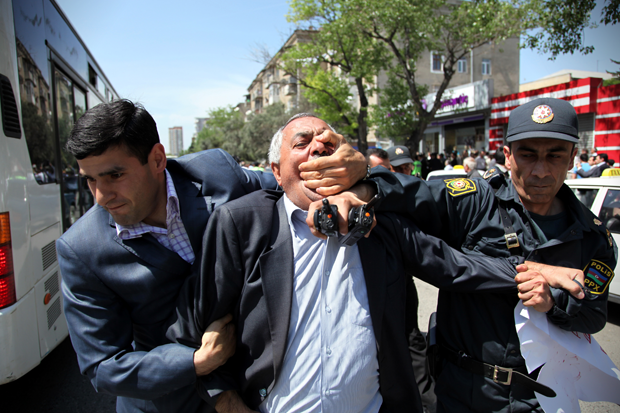
Narimanov Park, Baku, 15 May 2010. Police forcibly detain a political activist during an unsanctioned protest. Photograph by Abbas Atilay
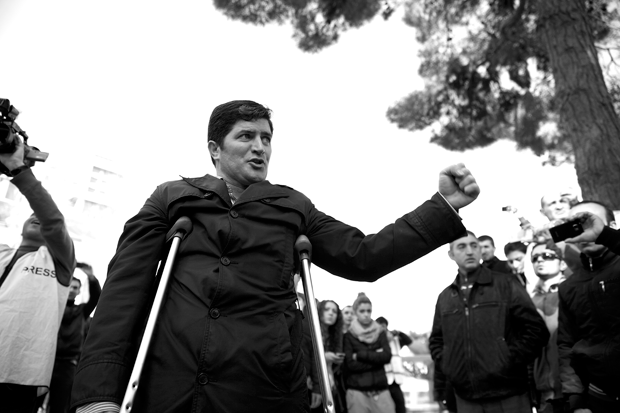
Fountain Square, Baku, 10 March 2013. A political activist during an unsanctioned demonstration protesting the deaths of military conscripts in non-combat situations. Authorities used excessive force to disperse the peaceful protest and detained more than 100 people. Photograph by Jahangir Yusif
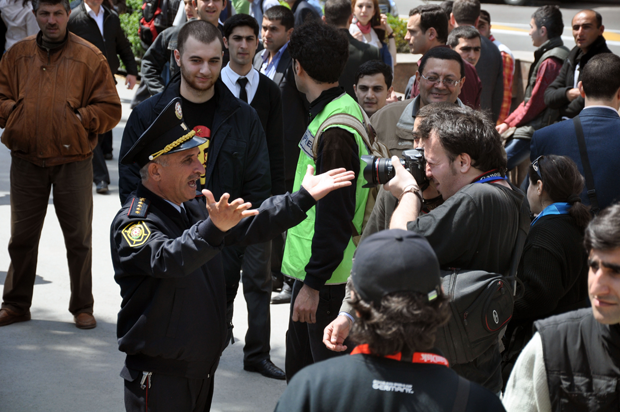
Sabir Park, Baku, 11 March 2011. During an unsanctioned political protest
in the wake of the Arab Spring, a police officer encourages journalists to take his photo. This was a rare move, which the photographer believes was intended to distract photographers from other aspects of the protest, such as police physically restraining protesters. Photograph by Mehman Huseynov
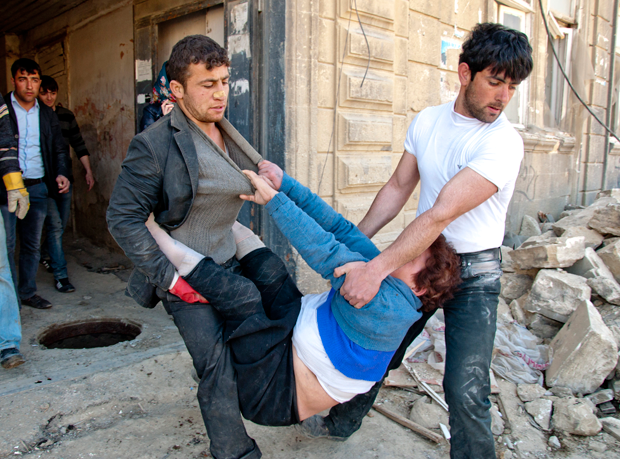
Shamsi Badalbayli Street, Baku, 2 April 2012. A resident is forcibly evicted from the area where the Winter Garden will be constructed. Approximately 300 complaints have been sent to the European Court of Human Rights related to forced evictions from this area. Photograph by Ahmed Muxtar
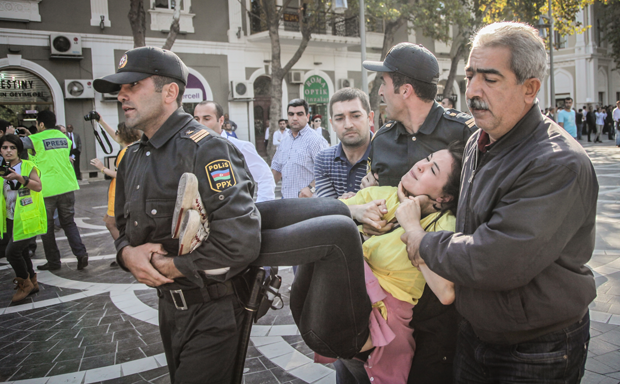
Fountain Square, Baku, 20 October 2012. Police detain a young opposition activist during an unsanctioned protest calling for parliament to be dissolved after a video was released showing an MP discussing the sale of parliamentary seats. Dozens of activists were detained during that protest. Photograph by Aziz Karimov
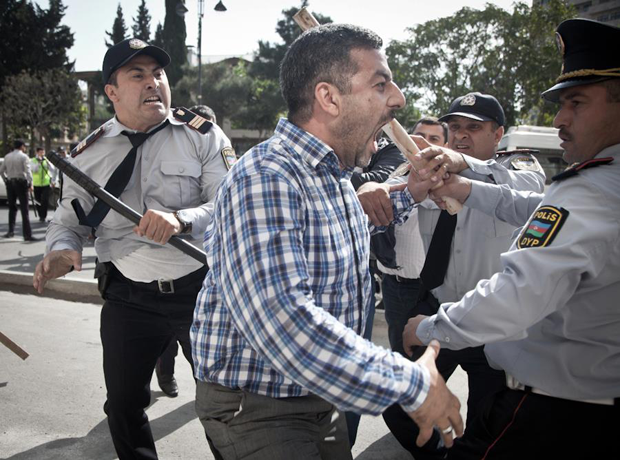
Hijab ban, 5 October 2013. Photograph by Aziz Karimov
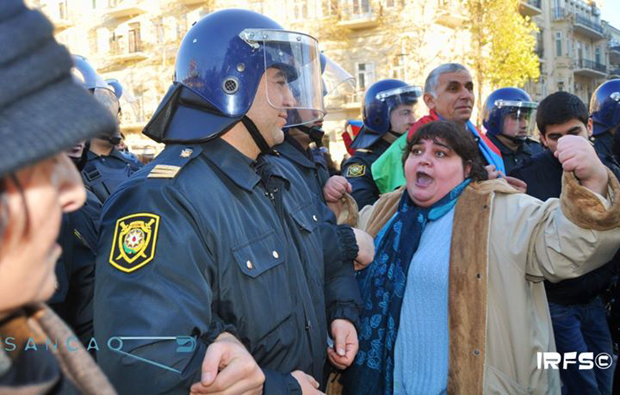
Investigative journalist Khadija Ismayilova confronts police. Photograph by Mehman Huseynov
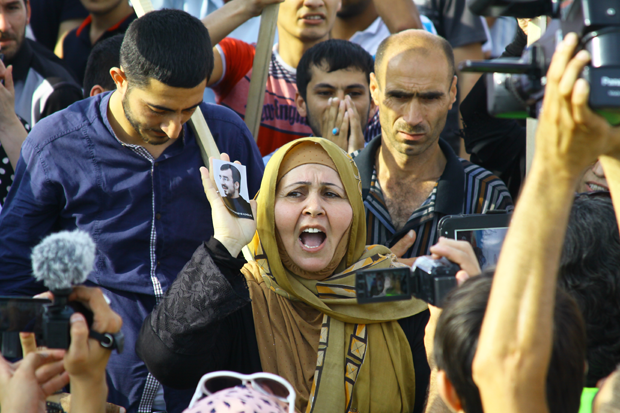
Nevreste Ibrahomova, head of Azerbaijan Islamic Party’s Women Council, holds the photo of an arrested Azerbaijani Islamist and chants freedom to him. Photograph by Shahla Sultanova
Photographers also face arrest and protracted legal action as a result of their work. Mehman Huseynov faces up to five years in prison on politically motivated hooliganism charges stemming from an altercation with a police officer during protests ahead of the Eurovision Song Contest in May 2012. The photographers featured in this story are among the few courageous individuals in Azerbaijan who remain willing to take on the risks associated with this work. They need international support and protection before they, too, become the subjects rather than the artists.”
Rasul Jafarov is the chairman of the Human Rights Club and project coordinator of the Art for Democracy Campaign. Rebecca Vincent is Art for Democracy’s advocacy director. She writes regularly on human rights issues in Azerbaijan
To find out more about the magazine and for subscription options, and read more about stories from the issue click here. These photographers will be part of an exhibition in London this winter. For more details, follow @art4democracy Join us to launch of Index on Censorship’s autumn issue on 15 October. To register for the event, click here.
8 Oct 2013 | Europe and Central Asia, News and features
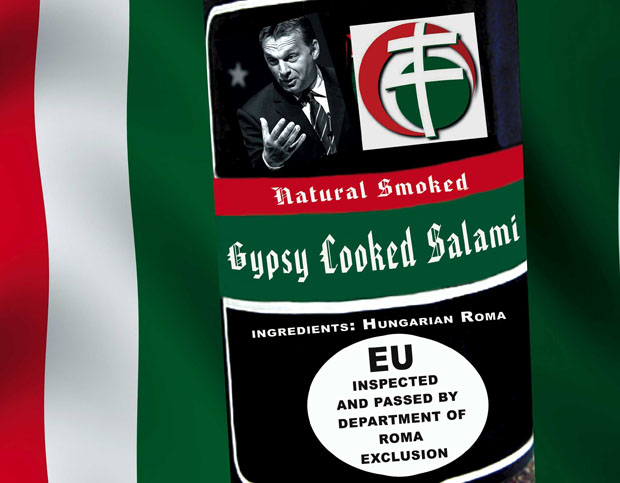
A poster from Marika Schmiedt’s exhibition Thoughts Are Free
The Hungarian Ambassador to Austria has called for the cancellation of a “racist” and “anti-Hungarian” art exhibition which opened yesterday in the Austrian city of Linz.
Thoughts Are Free, the exhibition by Roma artist Marika Schmiedt, features posters highlighting the plight of Roma people in Europe today. Several pieces draw parallels between the Nazis and Hungary’s far-right Jobbik party, whose views on the country’s Roma population have been well documented. In one poster, Hungarian Prime Minister Viktor Orbán from the Fidesz party is pictured on the label of “Natural Smoked Gypsy Cooked Salami” next to a Jobbik logo.
Ambassador Vince Szalay-Bobrovniczky labelled the exhibition: “a cheap provocation, openly racist and hostile against Hungary, and in violation of European values and the dignity of minorities, especially the Roma,” reported the Hungarian news agency MTI.
The Ambassador also took issue with it being located in Linz City Hall, stating that that the “socialist Linz city administration” will not back out of the “discrimination filled” project due to the artist’s political and ideological ties.
He contacted both Mayor Franz Dobuschs and Austrian President Heinz Fischer demanding that the exhibition be cancelled.
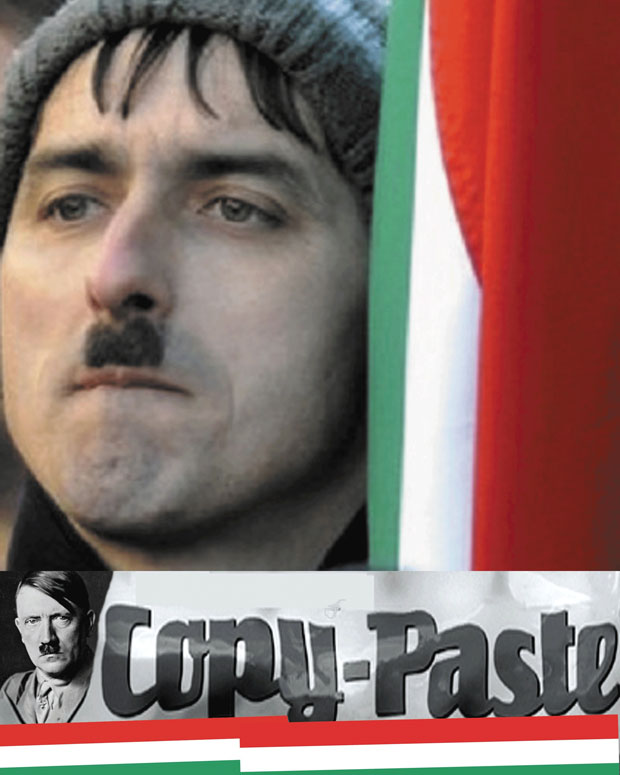
Image Marika Schmiedt

Image Marika Schmiedt
Linz City Hall has also been inundated with hundreds of emails from angry Hungarians, seemingly led by the Salzburg Hungarian Club, which, in May, invited Jobbik politician Tamás Sneider to speak.
This is not the first time Thoughts Are Free has caused controversy. When the posters were first exhibited at a construction site fence in Linz last November, the Austrian police removed them following complaints lodged by Hungarians.
Mayor Dobuschs however, did not budge: “Criticism and escalation is a legitimate method in a democracy,” he said in a reply to Szalay-Bobrovniczky. “We therefore stand by the artist who will receive a public forum at City Hall”.
The exhibition opening took place yesterday as planned, with police protection. Schmiedt told Index it was very well attended.
She added: “Maybe I might also dedicate a graphic to the ambassador?”






















